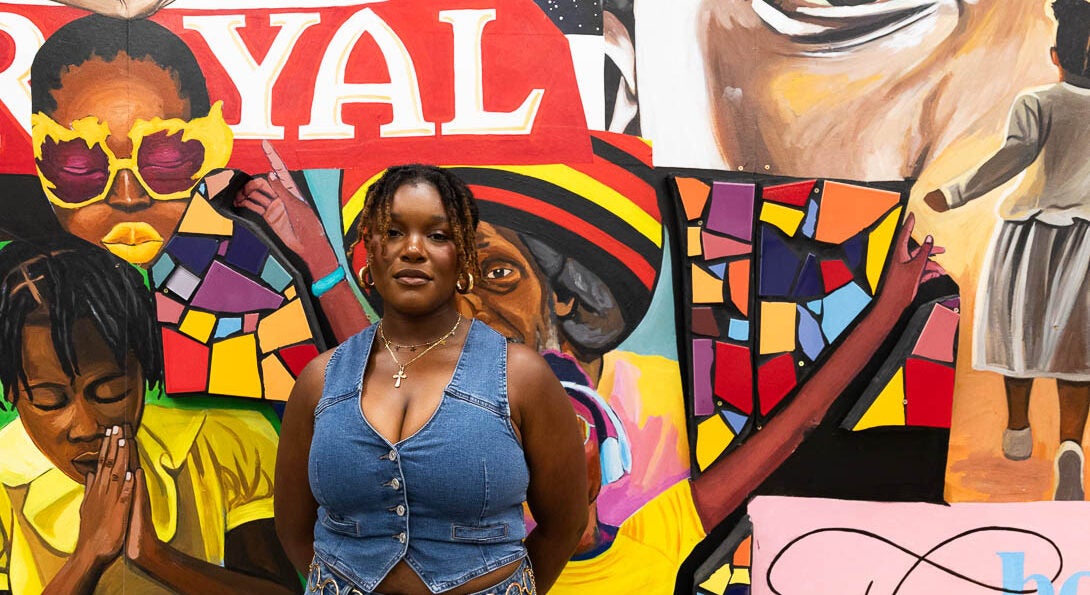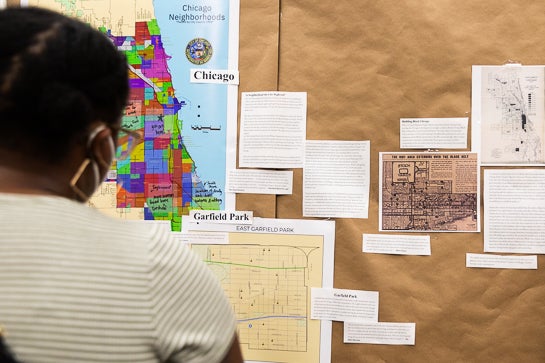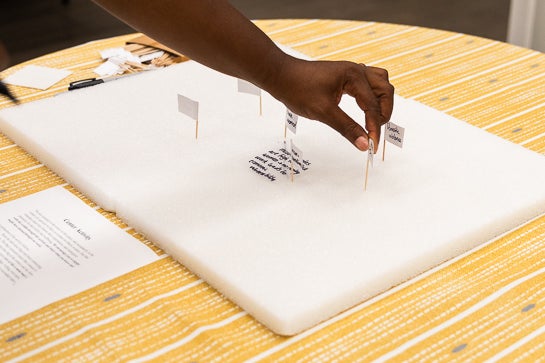Research, Mentorship and Collaboration: How this undergraduate student designed her first research project with LAS Black Studies Professor

Introduction to the interview
Name: Theresa Ezeani
Major: Public Health
Minor: Theatre and Black Studies
Year in School: Sophomore
Grief, Action, Joy- Black Women at the Center of the Universe

How did you choose your major?
At my core, I am a storyteller. A complete theatre kid and when it came to choosing a major, I never wanted to feel restricted. I knew I was interested in social injustice, public policy, and social reform. I chose Public Health as a major because it gave me the freedom to do all of the things I was interested in, while preserving my core as a storyteller.
What has been your favorite class or professor so far?
My favorite class so far has been Public Health 100 because of how challenging it was. We were given huge projects to work on during the year and I felt like the class taught me a lot about shortening the gap between ideation and execution.
Your research project culminated in an art installation at the Black Cultural Center. What did it mean to you to see your work presented in this way?
It meant everything. I have yet to find the words to describe how it felt to see all our research up everywhere. It felt vulnerable, but safe. I felt like my whole heart was open for everyone to see. To think that this is one of the first times any of these cases have been talked about was extremely special.
Can you talk about your research project collaboration with Venus Obazuaye titled “Grief, Action, Joy- Black Women at the Center of the Universe”?
I took Black Studies 100 in spring 2024 and Dr. Williamson had a class where she talked about her work on Black Women and Serial Murder and after class, I went up to her and told her how cool I thought her work was. I slightly joked about helping her out with something over the summer if she needed it. She ended up taking me seriously and offered me summer research position a couple weeks later. Me, Venus, and one other person got the offer to work together to research Black Women and Serial Murder in Chicago. I was originally going to reject it because I knew I was going to be in Houston for the summer, but she just so happens to have a whole file on a serial murder that took place in Houston the same year I was born. The entire purpose of the project was to do research on the case and create a final presentation showing all our findings and the end of the summer. Before this offer, I had never done any writing or academic research, so it was very intimidating. I started off by looking at the victim names, police reports, documentaries, autopsy reports, and anything that I could find about the murder. I started a journal where I talked about what came up or me emotionally as I looked through the files and I had another document laying out all the facts that I found, and one day I just decided to combine them together to create the writing piece that I have now. With the presentation, it was mostly about finding a way to tether me and Venus’ topic together and we decided to come up with a mini art exhibit. The altar came about from us wanting to showcase all the pictures we found of the victims and to give them the memorial service that many of the victims never had. The title took us forever to figure out, but we knew the main purpose of the project was to make sure that the victim’s stories didn’t begin and end with grief. We hoped that the grief and emotions that came with the project would turn into action that came from a healthy place of joy and love for Black Women. Working with Venus on the project has been one of the most rewarding parts. I think that they’re extremely brilliant and I adore their willingness to be sensitive and affected by the work. The research project has had a lot of impact of people. Me and Venus are very shocked at the responses we are getting.
Interview with Theresa Ezeani

This research was under the mentorship of Associate Professor Dr. Terrion Williamson whose research is in similar vein of violence against black women and girls. How did it feel to be mentored by Dr. Williamson who has extensive knowledge in this field?
Listen, Dr. Williamson is who I want to be when I grow up. The fact that she trusted 19-year-old undergraduate students to conduct this research still confuses me. During the entire process, she was our rock, because the work had the tendency to feel very isolating especially because I was back home by myself doing the work. I would sometimes be scared to tell her I was feeling about the process, and she not only validated my feelings, but she had firsthand experience with them which was incredibly helpful.
Did you learn anything in this research that surprised you?
I learned a whole lot about my hometown and just its history overall. Using a different lens to see a place where you hold so much nostalgia was extremely painful, but necessary.
What resources have you connected with and found useful on campus?
I have found the Counseling center and the African American Academic Network to be the most helpful. I was able to find a safe space in those places during my first year.
What are your aspirations after graduation?
After graduation, I would love to enroll in a graduate acting or public health program. I would love to see how I could combine storytelling and public health.
If you could give your freshman year self-one piece of advice, what would it be?
To allow the adversity to shape you. I spent all my first year trying to get to the point of where I felt confident and in control but feeling like I “got it” will take me out of my position of being a student. Give yourself as much grace as you can and understand that this is supposed to be hard. It’s new.